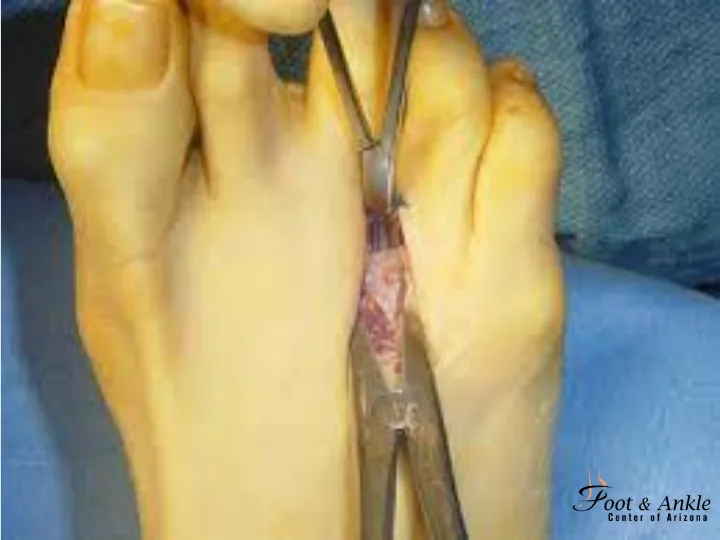Neuromas can be debilitating, causing pain and discomfort that interferes with daily life. Commonly affecting the foot, a neuroma is a thickened nerve often resulting from irritation or pressure. Morton’s neuroma, a prevalent type, typically develops between the third and fourth toes. While non-surgical treatments can offer relief, severe cases may require neuroma foot surgery to restore comfort and mobility. This article delves into everything you need to know about neuroma foot surgery, from its necessity to recovery.
What Is a Neuroma?
A neuroma is a benign growth or thickening of nerve tissue. It often forms in the feet due to repetitive stress, improper footwear, or abnormal foot structures. Morton’s neuroma, the most common type, causes sharp, burning pain, numbness, or a sensation like stepping on a pebble.
Risk factors for neuromas include:
- Wearing tight or high-heeled shoes.
- High-impact sports like running or tennis.
- Conditions such as flat feet or bunions.
Recognizing symptoms early and seeking medical advice is crucial to prevent worsening discomfort.
When Is Neuroma Foot Surgery Recommended?
For many, non-surgical treatments like orthotics, physical therapy, and anti-inflammatory medications effectively alleviate neuroma symptoms. However, surgery becomes necessary when:
- Pain persists despite conservative treatments.
- Neuroma size or pressure leads to severe functional limitations.
- Daily activities, including walking or standing, become excruciating.
A thorough consultation with a podiatrist or foot specialist, including imaging and physical assessments, helps determine whether surgery is the best option.
Types of Neuroma Foot Surgery
1. Decompression Surgery
This procedure involves releasing tight ligaments and tissues surrounding the affected nerve, reducing pressure. Decompression surgery is minimally invasive and can significantly ease symptoms without removing the nerve.
2. Neurectomy (Nerve Removal)
When decompression isn’t sufficient, the affected nerve may be surgically removed. This option eliminates pain but may leave the patient with some permanent numbness in the affected area. While effective, it requires careful post-operative care to avoid complications.
The Surgical Procedure: What to Expect
Pre-Surgery Preparation
Before surgery, your doctor will conduct a detailed evaluation, including:
- Imaging tests like X-rays or MRIs to locate the neuroma.
- Reviewing your medical history to minimize risks.
- Instructions to prepare, such as fasting or pausing certain medications.
During Surgery
Neuroma surgery is typically performed as an outpatient procedure under local or general anesthesia. Depending on the chosen method:
- The surgeon makes a small incision near the neuroma.
- In decompression surgery, tight tissues are carefully released.
- For a neurectomy, the surgeon removes the thickened nerve segment.
Post-Surgery Recovery
Recovery varies based on the procedure:
- Week 1-2: Rest and limited mobility; keep the foot elevated.
- Week 3-4: Gradual weight-bearing with proper footwear.
- Month 2+: Return to normal activities with improved comfort.
Following your doctor’s advice ensures optimal healing.
Benefits of Neuroma Foot Surgery
Neuroma foot surgery offers several advantages, including:
- Relief from Chronic Pain: Surgery eliminates the persistent discomfort associated with severe neuromas.
- Improved Mobility: Patients regain the ability to walk and perform daily activities without hindrance.
- Enhanced Quality of Life: Pain-free movement restores confidence and independence.
Many patients report high satisfaction rates, with long-term relief from symptoms.
Risks and Complications
While generally safe, neuroma foot surgery carries some risks:
- Swelling and Bruising: Common and typically resolve within weeks.
- Temporary Numbness: Especially after a neurectomy, though this may persist in some cases.
- Infection or Scarring: Rare but manageable with proper care.
Discussing potential risks with your surgeon helps set realistic expectations.
How to Choose the Right Surgeon for Neuroma Foot Surgery
Selecting an experienced specialist ensures a successful outcome. Key considerations include:
- Credentials: Board-certified podiatrists or orthopedic surgeons.
- Experience: Proven expertise in neuroma-related procedures.
- Reputation: Positive patient reviews and testimonials.
During consultations, ask about the surgeon’s approach, recovery support, and success rates.
Alternatives to Surgery for Neuroma Treatment
For patients not ready for surgery, alternatives may provide relief:
- Orthotics: Customized shoe inserts reduce pressure on the neuroma.
- Corticosteroid Injections: Minimize inflammation and pain temporarily.
- Sclerosing Therapy: Alcohol-based injections shrink the neuroma over time.
- Lifestyle Adjustments: Changing footwear, avoiding high heels, or switching activities.
These options can delay or prevent the need for surgery in mild to moderate cases.
Cost and Insurance Coverage
The cost of neuroma foot surgery varies depending on location, surgeon expertise, and procedure type.
- Average Costs: $2,000 to $5,000, excluding additional expenses like imaging or follow-ups.
- Insurance: Many policies cover medically necessary surgeries. Verify your coverage and pre-authorization requirements in advance.
Financial planning and discussing options with your provider can ease the process.
Neuroma Foot Surgery FAQs
- Is neuroma foot surgery painful?
Most patients experience only mild discomfort during recovery, manageable with prescribed pain relief. - How long does it take to recover?
Full recovery may take 6-8 weeks, with many resuming normal activities within 4 weeks. - Can a neuroma come back after surgery?
Recurrence is rare, especially with proper post-surgery care and preventive measures.
Conclusion
Neuroma foot surgery offers hope to individuals grappling with severe pain and mobility challenges. By addressing the root cause, this procedure restores comfort, function, and quality of life. If you’re struggling with neuroma symptoms, consult a trusted specialist to explore your options and determine whether surgery is right for you. With the right care, you can take confident steps toward a pain-free future.





